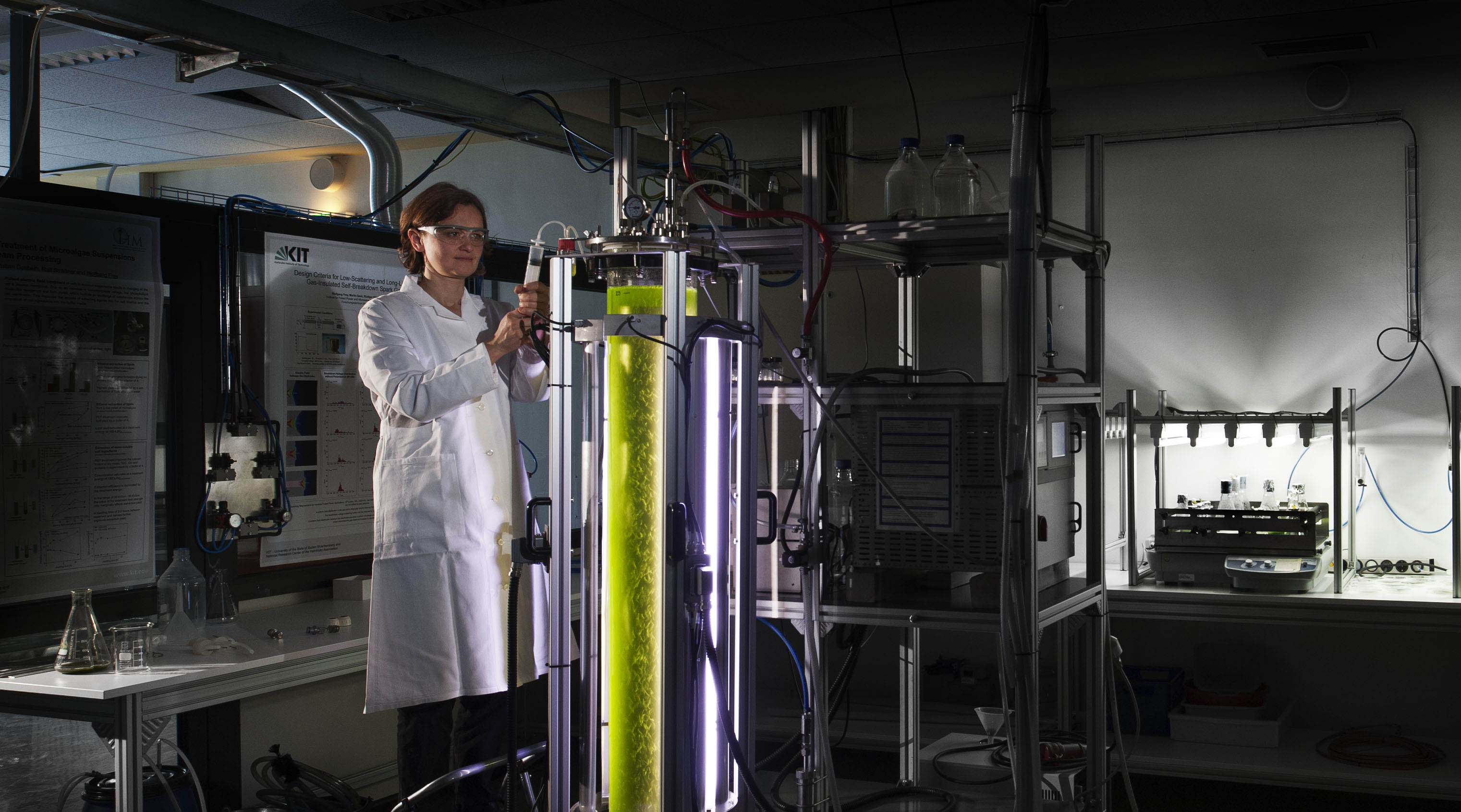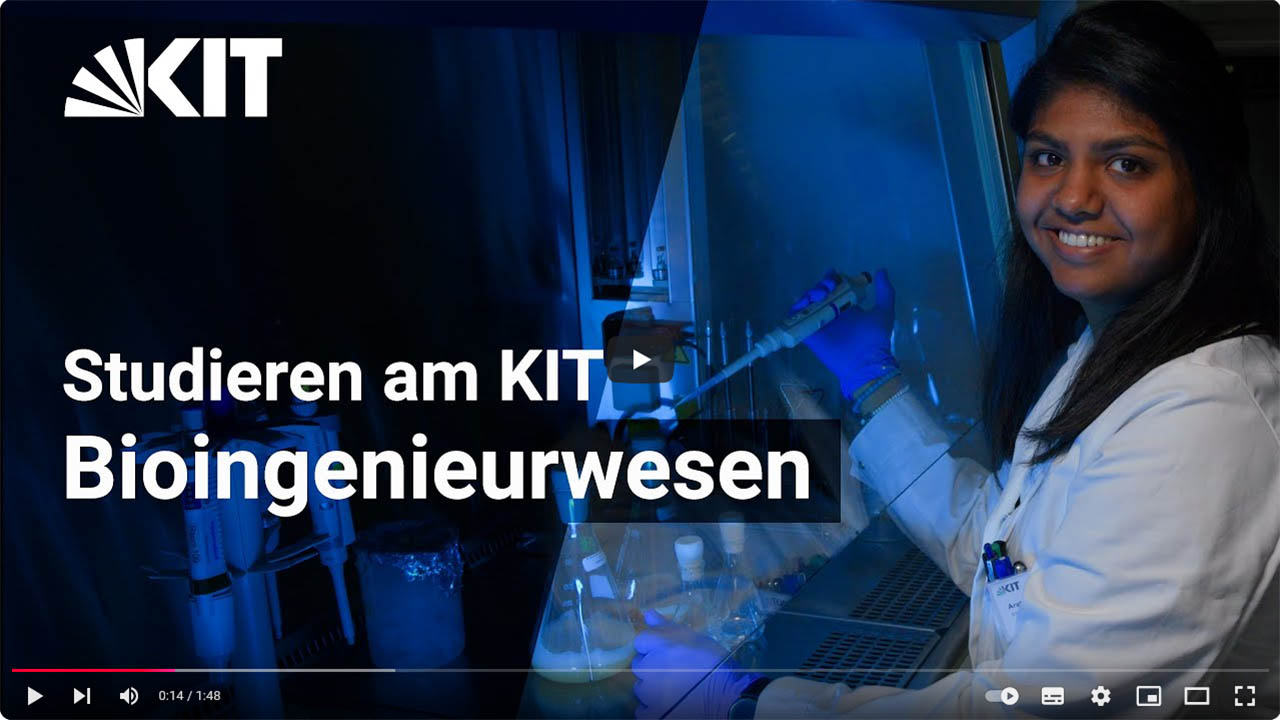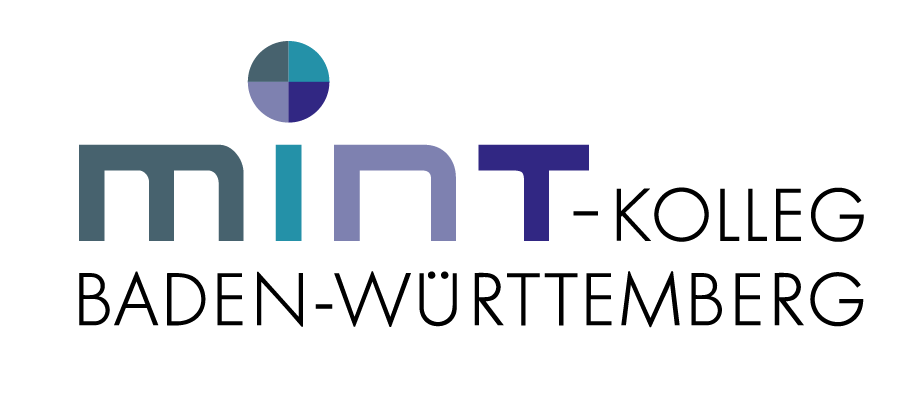Degree: Bachelor of Science (B.Sc.)
Regular program length: 6 semester (full-time program)
Credit points (ECTS): 180 credit points
Language of instruction: German
Higher semester: no
Higher semester: winter and summer term
First semester: July 15
Higher semester: September 15 for winter term, March 15 for summer term
First semester: July 15
Higher semester: July 15 for winter term, January 15 for summer term
Program details
What is it all about?
Building on a wide range of fundamentals - in mathematics, chemistry, biology and, above all, engineering - you will gain a deep understanding of biotechnological processes and solutions and how you can analyze and optimize them. In addition to the lectures, you will also attend laboratory courses. In the higher semesters, you can specialize in a profile subject, for example in refrigeration technology, food technology or recycling management. The Bioengineering degree program offers you a deep insight into process engineering and its numerous potential fields of work.
Program structure
During your studies, you have various subjects, which consist of one or more modules. A module deals with a specific topic and consists of one or more courses. In the module handbook for your degree program, you will find a description of the modules and their subject assignment as well as a study plan. This gives you an orientation as to which courses you should attend in which semester in order to complete your studies within the standard period of study. It takes into account a balanced distribution of courses over the individual semesters. It also ensures that you are first taught the important basics before moving on to more advanced topics. Your individual course of study may differ from this.
The Bioengineering degree program is divided into a mathematical and scientific, engineering and process engineering foundation course with the following subjects:
- mathematical and scientific fundamentals: in this subject you will mainly deal with mathematics and chemistry, but also with mathematical modeling and data analysis.
- engineering fundamentals: lectures and exercises on mechanics, apparatus engineering, control engineering and system dynamics, thermodynamics, fluid dynamics or mass transfer are on the program here.
- process engineering fundamentals: in addition to the introduction to bioengineering, you will study bioprocess engineering and two specializations from mechanical process engineering, thermal process engineering and chemical process engineering in the elective area.
In addition to the fixed modules of the foundation course, you have a number of options in these subjects, particularly in the higher semesters:
- process engineering elective: here you will deepen your basic knowledge of process engineering both theoretically and practically in the laboratory and deal with high-performance plastics or biotechnological separation processes, for example.
- profile subject: towards the end of the bachelor's degree program, you choose a profile-forming focus from over ten options, for example recycling management, biotechnology or refrigeration technology.
- interdisciplinary qualifications: programming / numerical simulation with MatLb and scientific writing with LaTeX are mandatory, and you can also choose to take a language course or an offer from the House of Competence, for example.
Stays abroad
KIT offers a wide range of options for stays abroad, from individual courses to a year abroad. Especially if you are interested in a longer stay abroad, it is advisable to contact the International Students Office early on.
Bachelor's thesis
At the end of your bachelor's degree, you will complete your bachelor's thesis, an academic paper that allows you to apply and deepen the knowledge and skills you have acquired. It usually deals with a specific topic from your field of study and requires independent research, analysis and writing. The bachelor's thesis takes four months to complete. The bachelor's thesis can also be completed externally, for example in a company. The bachelor's thesis also includes a presentation of your results.
Additional information
In addition to the module handbook, our booklet about the study program is a useful source of information. It also covers topics such as application procedure, starting your studies and career prospects.
Qualification profile of the graduate
The focus of bioengineering is on process engineering in the context of an industrial, engineering-driven application of biological and biotechnological principles. In this way, bioengineering differs from natural sciences programs, biotechnology or molecular biotechnology, which deal primarily with the utilization of biological principles. Bioengineers make a crucial contribution to the development of interdisciplinary approaches for creating an energetically and materially sustainable, post-fossil economy.
The Bachelor's program provides knowledge on scientific fundamentals and methodical expertise in the area of bioengineering. The Bachelor's degree will qualify students to apply the acquired theoretical knowledge to a specific professional field. Furthermore, students will gain the knowledge and skills that are necessary to complete a Master's program successfully.
The compulsory program in the first and second year focuses on methodical and qualified fundamental knowledge of mathematics, natural sciences, biotechnology and engineering. The main focus is on process engineering of biological material systems, reactions and processes in theory (basic lectures) and practice (introductory laboratory courses).
The knowledge acquired in the first and second year is not only the basis for the third year of the Bachelor's program, but also for the following Master's studies. Mandatory elective courses in the third year of study offer the opportunity to gain in-depth knowledge in a specialist area for the first time. These mandatory elective courses comprise technological aspects and a practical project work (group work). Within their Bachelor's thesis, students prove the ability of working on specialized problems independently and within a defined time frame using scientific methods.
Graduates are qualified to identify, abstract, and solve technical problems using the basic knowledge provided during the Bachelor's program. Furthermore, they can evaluate biotechnological products and processes systematically as well as select and apply analyzing and simulation tools. They are able to combine theory and practice as well as to organize and implement projects independently. Graduates are able to collaborate with experts in other fields.
Career prospects
After completing your bachelor's degree, you have the opportunity to deepen your knowledge in a master's degree program. If you are drawn to a professional career, there are many fields of work open to you. These include the energy, food, pharmaceutical and cosmetics industries, as well as waste treatment, renewable raw materials, medical, environmental and supply engineering. You will optimize processes in terms of sustainability, safety and product quality, design technical equipment or develop new products. You can also use your knowledge in quality control or sales. A master's degree is usually required for management positions and activities in research and development. Bachelor's degrees are also popular in production, design and sales.
Characteristic features of the degree program
Characteristic features of Bioengineering B.Sc. at KIT
- own department with a wide range of courses
- research-oriented teaching
- over 10 profile subjects to choose from
- support during the start of your studies through "smartMentoring"
- prepatory courses at the MINT-Kolleg
- support in organizing your studies from the Student Advisory Service and academic advisors
What KIT has to offer
- central campus close to the city forest and right next to the city center
- orientation week before the start of lectures
- 24-hour library offering single and group working places
- wide range of inexpensive catering options (dining hall, cafeteria, Koeri and Pizzawerk)
- numerous interdisciplinary offers for personal and professional development, e.g. Lernlabor, Schreiblabor and Perspektivenlabor
- study abroad, e.g. via Erasmus
- excellent university sports facilities with a large selection of sports
- comprehensive cultural offerings with university orchestras, choirs and theater groups
- extensive support for career entry and self-employment
- Lernraum app
- internationally oriented degree programs and diverse exchange programs
- modern laboratories and practical teaching methods
- diverse student initiatives, clubs and opportunities to actively participate in campus life
- stay in touch after graduation via the alumni network
Admission and language requirements
Higher education entrance qualification (HZB)
Germans and persons of equal status to Germans (i.e. EU/EEA nationals and non-EU/EEA nationals with a German higher education entrance qualification) are entitled to study at KIT if they have one of the following qualifications:
- General higher education entrance qualification (Abitur)
- (relevant) subject-restricted higher education entrance qualification (not Fachhochschulreife)
- Delta examination of the University of Mannheim (for holders of a Fachhochschulreife)
- recognized advanced vocational training (e.g. master craftsperson) or vocational training, professional experience and aptitude test for those with professional qualifications
For further options, see §58 of the "Landeshochschulgesetz" (State Higher Education Act).
Please note: German nationals with a foreign school-leaving qualification must have the relevant "Regierungspräsidium" (regional authority) certify that their qualification is equivalent to the German Abitur.
For non-EU/EEA nationals with a foreign school-leaving certificate (hereinafter also referred to simply as non-EU/EEA nationals), the school-leaving certificate from some countries is recognized as a direct university entrance qualification in Germany. In many cases, however, in addition to the school-leaving certificate, a university entrance examination and/or a successful year of study in the home country and/or the "Feststellungsprüfung" must be proven with valid documents in order to be allowed to study a bachelor's degree in Germany. You can find the country-specific regulations in the DAAD admissions database or on the Anabin website (in German only) of the "Zentralstelle für ausländisches Bildungswesen" (Central Office for Foreign Education). Further information is available from the International Students Office.
Language requirements and certificates
For the bachelor's degree program in Bioengineering, you need sufficient knowledge of the German language, which corresponds to at least level C1 of the Common European Framework of Reference for Languages (CEFR).
Proof of sufficient German language skills
Your higher education entrance qualification (HZB) is sufficient proof of your German language skills,
-
if you obtained it at a German-speaking school in Germany or abroad,
-
if you are a graduate of a bilingual secondary school in Germany or abroad and have passed a bilingual German examination, such as the AbiBac or the Gemischtsprachiges International Baccalaureat (GIB) or
-
if you graduated from a foreign school, but there is another official agreement with the respective country on the recognition of your school-leaving certificate or language certificate as proof of language proficiency for university studies in Germany.
A complete list of foreign school-leaving qualifications and language certificates that are recognized as proof of sufficient German language skills can be found on the website of the Kultusministerkonferenz (Standing Conference of the Ministers of Education and Cultural Affairs of the Länder in the Federal Republic of Germany).
If you did not obtain your higher education entrance qualification at a German-speaking institution, you must provide a separate language certificate - regardless of your nationality. Only the following are accepted
- the passed „Prüfungsteil Deutsch“ of the Feststellungsprüfung,
- the passed DSH with the overall result DSH-2,
- the passed TestDaF level 4 in all four parts of the exam (reading comprehension, listening comprehension, written expression, oral expression) or
- a comparable, recognized certificate of sufficient German language skills.
To find out which other recognized certificates can be accepted as comparable by KIT, please contact
- as a German or German-equivalent applicant: Studierendenservice
- as an applicant with non-EU citizenship: International Students Office
Please note:
Language certificates are extremely important application documents that can prevent your enrollment if you do not submit them on time. Therefore, check early on in the application process whether you have the necessary language certificates for your degree program and, if necessary, plan to take one of the language tests mentioned above. The deadline by which you must submit language certificates corresponds to the enrollment deadline stated in your admission offer. In justified cases, you can apply for an extension of this deadline. The extension can be granted until the start of the lecture period at the latest.
Additional necessary requirements for enrollment
For Germans and those with German equivalent status, an additional necessary requirement for enrollment is proof of participation in a study orientation test (e.g. www.was-studiere-ich.de) or a study orientation consultation in accordance with §7 of the "Landeshochschulgesetz" (State Higher Education Act), e.g. by the Student Advisory Service (ZSB) of KIT. Non-EU/EEA nationals do not have to provide this proof.
Selection procedure
Selection procedure for German and German-equivalent applicants
There are 80 study places available. After deducting the preliminary quotas for hardship cases (5%), foreigners (10%) and second degree applicants (2%), 10% of the study places are allocated to the applicants with the longest waiting time. 90% of study places are allocated via a selection procedure.
The selection procedure is mainly based on the applicants' academic performance. On the basis of these achievements and so-called other achievements, a ranking list is made according to points.
Calculation of the selection points:
- sum of the points in the Abitur certificate divided by 56 or 60
max. 15 points
- arithmetic mean (sum of all points divided by the number of courses) of the upper level school courses:
- Mathematics (weighting 2-fold)
- top-graded scientific/technical subject (weighting 2-fold)
- German or top-graded foreign language taken in all four upper level school terms (weighting 1)
max. 15 points - other achievements (completed relevant vocational training, relevant professional practice, special training, practical activities, extracurricular achievements and qualifications)
max. 5 points
value 1 + value 2 + value 3 = max. 35 points in total
The results of the selection procedures from previous years can be found in the "Zulassungsergebnisse" brochure ( only available in German).
Detailed information on the selection procedure can be found in the statutes for the university's own selection procedure for the degree program.
Selection procedure for applicants from non-EU/EEA countries
Please note that a different selection procedure applies for third-country nationals (non-EU/EEA). This selection procedure is based on the higher education entrance qualification. The higher education entrance qualification can be based on academic achievements in school, any previous academic achievements at universities and/or the "Feststellungsprüfung".
Application portal
Application for the 1st semester
Application for a higher semester
Study preparation
Prepatory courses at KIT: The MINT-Kolleg offers prospective and first-year students support in natural science and technical subjects (STEM).
In addition, the KIT-Departments offer special preliminary courses before the start of the semester program during the "O-Phase" (orientation week).
Support during your start at KIT
The KIT offers support for all first-year students in order to have a successful start of their studies. Numerous orientation events and mentoring programs at the KIT-Departments help students to make friends, orientate themselves and find support where needed. The central online portalstudienstart.kit.edu is a first guide to all important offers, brings together all relevant information and contains helpful hints for a successful start of your studies:
- advisory centers
- mentoring programs
- info sessions
- workshops
- extensive online information
Contacts
Student advisor
Student advisory services (ZSB)


Karlsruher Institut für Technologie (KIT)
Zentrale Studienberatung (ZSB)
Engelbert-Arnold-Str. 2
76131 Karlsruhe
Karlsruher Institut für Technologie (KIT)
Studierendenservice
Kaiserstr. 12
76131 Karlsruhe
First point of contact for international applicants
Karlsruher Institut für Technologie (KIT)
International Students Office (IStO)
Adenauerring 2
76131 Karlsruhe
Printed matter
Module handbook
Statutes and regulations
| Titel | Stand | Download |
|---|---|---|
| 2021 KIT 033 Satzung zur Änderung der Satzung für das hochschuleigene Auswahlverfahren im Bachelorstudiengang Bioingenieurwesen am Karlsruher Institut für Technologie (KIT) | 08.07.2021, veröffentlicht 12.07.2021 | |
| 2018 KIT 004 Satzung für das hochschuleigene Auswahlverfahren im Bachelorstudiengang Bioingenieurwesen am Karlsruher Institut für Technologie (KIT) | 27.02.2018, veröffentlicht 27.02.2018 |
| Titel | Stand | Download |
|---|---|---|
| 2025 KIT 012 Satzung zur Änderung der Studien- und Prüfungsordnungen des Karlsruher Institut für Technologie (KIT) aufgrund der Neugestaltung der Abschlussdokumente | 26.02.2025, veröffentlicht 27.02.2025 | |
| 2023 KIT 043 Studien- und Prüfungsordnung des Karlsruher Instituts für Technologie (KIT) für den Bachelorstudiengang Bioingenieurwesen | 28.04.2023, veröffentlicht 28.04.2023 |
Teaching calendar
WT 2024/25
10-21-2024 to 02-15-2025
ST 2025
04-22-2025 to 08-02-2025
WT 2025/26
10-27-2025 to 02-21-2026
ST 2026
04-20-2026 to 08-01-2026
WT 2026/27
10-26-2026 to 02-20-2027
ST 2027
04-19-2027 to 07-31-2027
WT 2027/28
10-25-2027 to 02-19-2028
ST 2028
04-18-2028 to 07-29-2028
Lectures will not take place:
- From 12-24 to 01-06
- the week after Pentecost
- on all public holidays in the state of Baden-Wuerttemberg










